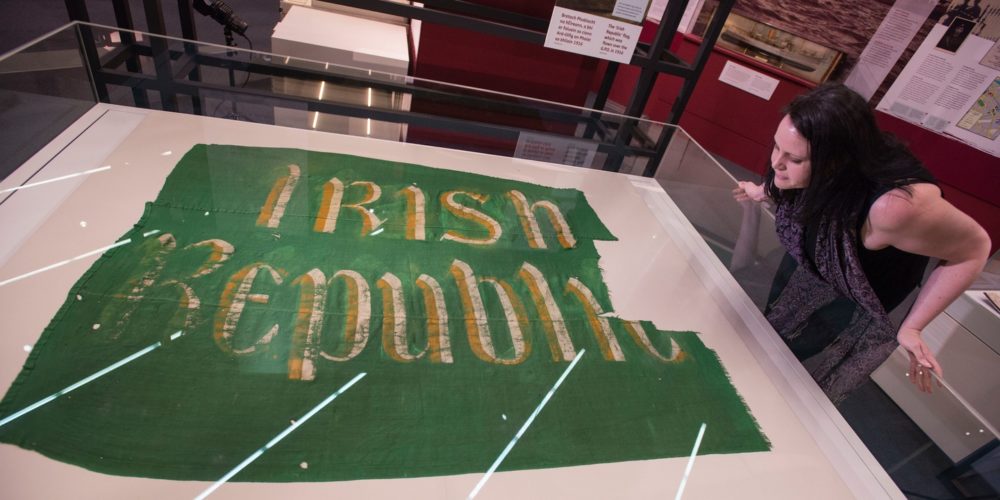As the “Irish question” comes back to haunt British Toryism as well as British social democracy, it is worth reflecting on what attitude Irish Marxists should take on the national question.
It is worth pointing out that nationalism is only ever criticised when it comes from an oppressed people; very seldom is it understood that nationalism in its worst forms usually comes from an oppressor country. Then it becomes “common sense,” the default.
While calls for “no borders, no nations” or such slogans might go down well as sound bites at union conferences, they do not offer any concrete political programme that can unify the class. The reality is that nations are a material thing, a result of the uneven development of capitalism over the centuries. The contradiction between the core and peripheral nations is one of the sharpest contradictions in the era of imperialism.
Lenin, in his article “On the National Pride of the Great Russians,” asks:
Is a sense of national pride alien to us, Great-Russian class-conscious proletarians? Certainly not! We love our language and our country, and we are doing our very utmost to raise her toiling masses to the level of a democratic and socialist consciousness.
Indeed Lenin criticised Rosa Luxemburg’s dismissal of nationalism as “actually playing into the hands of the Black-Hundred nationalism of the Great-Russians!”
Patriotism has always been a characteristic of socialist states, from the USSR to Cuba. Even the anti-fascist war in which 26 million Soviet lives were lost defeating the Nazis is known as the Great Patriotic War. However, it deserves to be pointed out that among many in the other eastern European socialist states Soviet patriotism was seen, rightly or wrongly, as a cover for Great-Russian chauvinism.
More damagingly, the reverence for the Soviet Union on the grounds of its role in defeating fascism and liberating eastern Europe, as well as its many economic and social achievements, led to a mechanical approach to building socialism in the people’s democracies that arose in the late 1940s. In socialist Cuba an important emphasis was put on avoiding these mistakes and creating a socialism based on Cuban conditions, on Cuba’s history, rather than being an imitation of the USSR. It was this that led to socialist Cuba preserving its system after the counter-revolutions in eastern Europe, taking inspiration from the Peruvian Marxist José Carlos Mariátegui, who said:
We certainly do not want socialism in Latin America to be a copy or imitation. It should be a heroic creation. We have to give life to Indo-American socialism with our own reality in our own language. Here is a mission worthy of our generation.
Despite many on the left rightly praising Cuba for the revolution’s independence and its slogan of Patria o muerte (homeland or death), when anyone in Ireland raises the point that we should learn from this positive example of patriotism and socialism being one and the same, those same leftists recoil in horror. They see the Tricolour, the national anthem and the history of this country not as symbols that can inspire and unify people but as sources of division. They seem not to understand that not only the Cuban revolution but other socialist revolutions came from national liberation struggles, as in Viet Nam, Mozambique, Angola, and China. Even Ho Chi Minh wrote:
At first patriotism, not yet communism, led me to have confidence in Lenin, in the Third International. Step by step, along the struggle, by studying Marxism-Leninism parallel in participation in practical activities, I gradually came upon the fact that only socialism and communism can liberate the oppressed nations and the working people throughout the world from slavery.
To be blunt, some people’s belief is not in the Reconquest of Ireland but instead they pin their hopes on our betters, whether it be the remaining vestiges of British social-imperialism or the new, European cosmopolitanism.
The socialists must explain to the masses that British socialists who do not demand freedom to separate for the colonies and Ireland . . . and who do not extend their revolutionary propaganda and revolutionary mass activity directly to the sphere of struggle against national oppression . . . that such socialists act as chauvinists and lackeys of bloodstained and filthy imperialist monarchies and the imperialist bourgeoisie.
Lenin
The Reconquest of Ireland will only come about as a conscious act by a risen people. A positive vision of patriotism, based on making the working class the ruling class in the nation, not only offers the ability to advance a programme that challenges cross-class nationalism in its worst expressions but also allows us to bring unity to our class, in the best patriotic traditions of our people.
These patriotic traditions include not only political leaders such as Connolly, Pearse and Tone but also cultural figures in our nation’s history, from Jonathan Swift and Oscar Wilde to Brendan Behan. It also includes an appreciation of our people’s history, a history of anti-imperialism and working-class resistance, not only in Ireland but in all corners of the globe, such as Elizabeth Gurley Flynn (a founder-member of the Communist Party of the USA), Mary “Mother Jones” Harris in the United States, and Daniel Florence O’Leary, the Corkman who served with the Liberator Simón Bolívar.
From the IRB Manifesto of 1867 to the Democratic Programme of the first Dáil, we need to reclaim our people’s pride.






